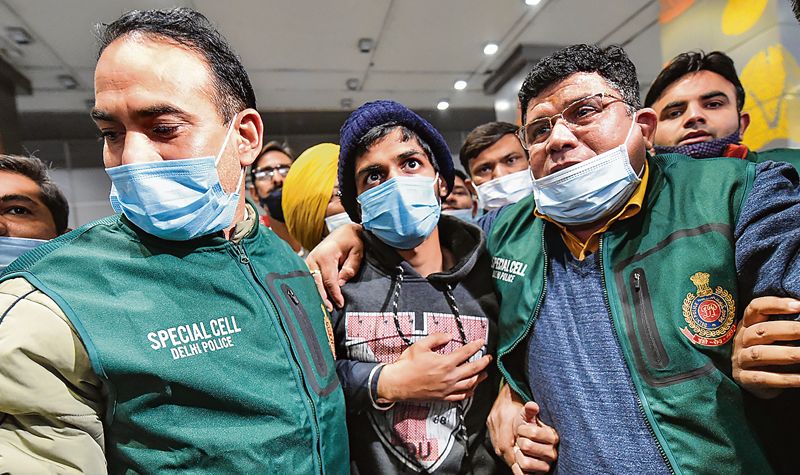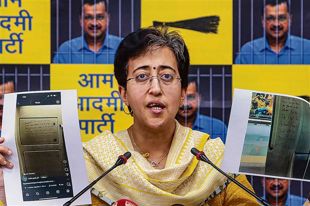
Unsafe: There is a need to protect people from unwarranted content on mobiles. PTI
Pavan Duggal
Cyber Law Expert
The Bulli Bai app case has once again brought to the fore the need for appropriate regulation of mobile content targeting not only women but also communities. The Internet has made it possible for anyone sitting in one part of the world to go ahead and target people in another part through electronic content and also through mobile apps.
Mobile apps have become the flavour of the times. Almost every person seems to be dependent on them. With new apps coming in every day, there is no denying the fact that they have a huge impact on not just the life of a person but also on the manner he or she thinks, behaves or perceives.
That is why mobile app developers are increasingly looking at newer areas of demand and customising their apps. The Bulli Bai app is a manifestation of a medieval mindset — treating women as property.
Today, to talk about women being made available as items for online auction is an idea that is abhorrent to the values of modern civilisation. However, the fact is that if this kind of content is still continuing to be made available in the online ecosystem, the question that comes up for consideration is: What is the Indian legal stand on the same?
The Indian legal framework does not have provisions specifically pertaining to mobile apps. In fact, India does not have any mobile app policy. India has not even learnt from US states such as California which have detailed guidelines and policies on how app developers need to develop their mobile applications.
The only thing India currently has by way of a cyber law is the Information Technology (IT) Act, 2000, which is the mother legislation on everything pertaining to the electronic format. In 2000, we had not even covered mobile phones under the ambit of that law. However, by the time the IT (Amendment) Act, 2008, was passed, we added mobiles and all kinds of communication devices within the purview of the law.
However, when one goes through the provisions of the IT Act, one doesn’t find any direct provisions concerning mobile apps. Clearly, all app developers who develop apps or all app stores or play stores that host mobile apps are intermediaries under the Act because they are network service providers. Further, they are legal entities, who on behalf of other persons, are receiving, storing or transmitting particular electronic records.
However, though the government has the power to stipulate various parameters of due diligence for intermediaries under Section 87 of the IT Act, this power has never been exercised in the context of mobile apps per se. In fact, all intermediaries in the country are now mandated to exercise due diligence while they discharge their obligations under Section 79 of the Act if they have to take benefit of the statutory exemption of legal liability.
While rules and regulations have been framed by the Central Government pertaining to due diligence by the intermediaries, specific rules pertaining to mobile apps and the conduct of mobile app platforms have not been stipulated.
Even the Information Technology (Intermediary Guidelines and Digital Media Ethics Code) Rules, 2021, do not specifically deal with aspects pertaining to mobile apps. We have seen that the only governmental approach to any kind of unwarranted app is to go ahead and block it by exercising power given to the Centre under Section 69A of the IT Act.
Consequently, the government has been banning various mobile apps over the years. In the recent past, many Chinese apps were banned in the Indian digital environment.
A ban is never a successful bullet to bite because the moment you do it, you are actually pushing far more Internet traffic towards the banned mobile app. This is so because banning can never be absolute in today’s interconnected world. Even if you ban an app within the territorial boundaries of India, it is still available for access by users even in India, using virtual private networks.
So, consequently rather than banning such mobile content, countries have to come up with innovative approaches so as to deal with unwarranted content. In the Indian context, it will be great if we come up with a detailed legal framework to regulate mobile applications available in the Indian ecosystem and also to stipulate minimum parameters that need to be fulfilled by all developers of mobile applications and platforms hosting such mobile applications.
Hopefully, the Bulli Bai and other cases could propel the government into action in coming up with a dedicated new legal framework to govern the content that mobile applications can potentially publish. Further, it is hoped that the government also comes up with strong capacity-building measures so as to enhance the capacities and awareness levels among general users so that they do not get swayed by content published by unwarranted mobile applications.
Technology and law are always battling each other, and technology is invariably 10 steps ahead of the law. Therefore, while the adoption of mobile technology and mobile apps has reached a substantial level of maturity, it will be imperative that appropriate steps also need to be taken so as to update the existing Indian legal framework to meet the current challenges thrown up by unwarranted apps in the mobile ecosystem. Adopting such an approach will enable the nation to appropriately protect mobile users from potential exposure to undesirable content in the form of apps and other applications in the mobile ecosystem.
Join Whatsapp Channel of The Tribune for latest updates.




























